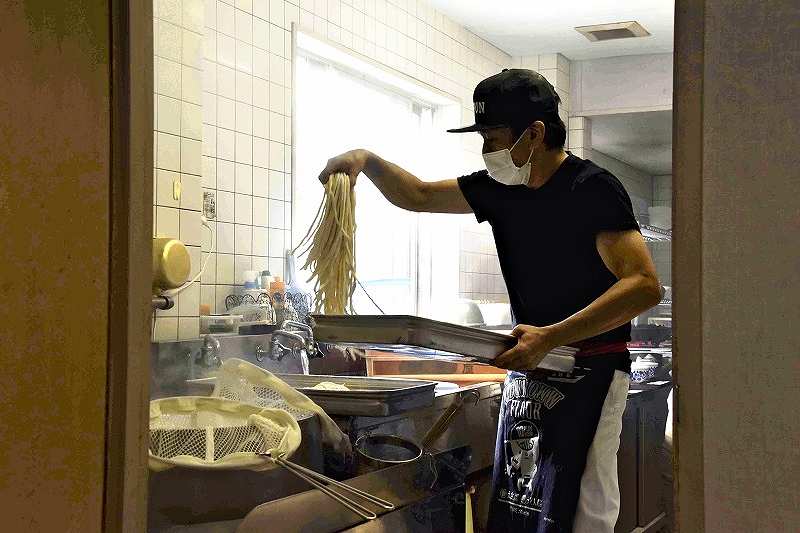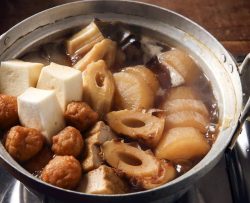
Takeshi Yamashita boils udon noodles.
12:30 JST, December 22, 2022
TAKAMATSU — Kagawa Prefecture, sometimes called “Udon Prefecture,” is famous for locals’ love of udon noodles. Naturally, the prefecture is home to many udon restaurants, but one shop stands out for its uniqueness, even by the standards of Kagawa. The shop keeps to an irregular schedule, and when it does open, it shuts down just 10 minutes later. Even the shop’s name, Juppun Udon (10-minute udon), references the brevity of its hours.
The shop was launched six years ago by the head of a noodle factory in the town of Kotohira. He used his lunchtime to prepare and serve udon to people in the factory’s neighborhood. Those dishes went viral on social media as “mythic udon,” and now fans flock to the shop from in and outside the prefecture.
Early morning queue
Shortly before noon on Oct. 27, steam from boiling noodles filled the second floor of the factory, which is part of the Osyoya noodle company, a manufacturer of udon noodles for gifts and other purposes. Then a sign reading “Open for 10 minutes” was put up at the entrance of the factory, and customers began to make their way upstairs. 10 minutes later, they left.
The shop makes only 35 servings a day. Some people start standing in line from very early in the morning to get one of the numbered tickets that are handed out starting at 9 a.m.
Shinobu Miyawaki, 49, has been regularly visiting the udon shop for more than five years.
“The flour mix changes each time, so I never get tired of the udon no matter how often I come here. If their hours were any shorter, I wouldn’t be able to finish the noodles. They must be the shortest [hours] in Kagawa,” Miyawaki said.
Preparing the noodles in the kitchen was factory head Takeshi Yamashita, 49. Yamashita comes from Takamatsu and became an udon maker after finishing high school. But once his employer closed shop, he started working at Osyoya at the age of 38, and subsequently become the factory head.
Osyoya does not run any udon restaurants. It only manufactures udon and sells the noodles at souvenir shops and other retailers. Yamashita felt a growing desire to see the faces of customers eating udon manufactured at the factory, and he brought the matter up with the company’s senior executive, Hideto Yamaji, asking him if it would be possible to serve udon at the factory. At first, Yamaji would not agree to any such project, but when Yamashita made a further plea, saying, “I’ll do it myself during my lunch break,” the senior executive said, “If you are that serious,” and gave him permission.
The shop’s 10-minute time limit is an inevitable consequence of having to provide the service during the factory’s lunch break, considering the time required for preparation and cleanup. The shop’s unique restrictions also explain why it is impossible for it to open during the factory’s busy periods. When the shop first started, the seating area for customers was just a corner of the factory’s store and the benches outside the factory, and there were days when no one came.
“It made me incredibly happy if just one customer told me, ‘It was delicious,’” Yamashita said.
The shop’s reputation grew through word of mouth. After a year serving up noodles, a TV show featured the shop. Social media also brought attention to Yamashita’s creation, and the company let him serve udon in the factory’s second-floor rest area.
Profits donated to charities
The shop kept an irregular schedule to begin with, but since the beginning of the novel coronavirus pandemic, Yamashita has also avoided serving udon on weekends and holidays to prevent crowding. This year, the shop has opened only seven times. The difficulty of getting a bowl of udon at the shop has spurred its popularity, and people now say it is the most difficult eatery to get into among all the udon shops in the prefecture that keep people lined up to dine.
The shop serves three type of udon noodle bowls: hot, cold and “kamadashi,” or “straight out of a boiling pot.” The dishes come in four different sizes: small, medium, large and extra large, and are priced between ¥200 and ¥400.
“My aim is not to make a profit,” said Yamashita, who donates what he earns to charities, such as those supporting children with allergies.
“There are many customers who buy our products that say they do so ‘because that factory head makes the noodles,’” Yamaji said. “At first, I opposed the idea. But now the whole company supports him.”
“The shop’s open for only 10 minutes, but I want to serve bowls that bring excitement to our customers,” Yamashita said.
The shop’s next open day and the hours for the day are announced on its Twitter account (@10pun_udon) about a week in advance.
Top Articles in Features
-

Tokyo’s New Record-Breaking Fountain Named ‘Tokyo Aqua Symphony’
-

Sapporo Snow Festival Opens with 210 Snow and Ice Sculptures at 3 Venues in Hokkaido, Features Huge Dogu
-

Tourists Flock to Ice Dome Lodge at Resort in Hokkaido, Japan; Facility Invites Visitors to Sleep on Beds Made of Ice
-

High-Hydration Bread on the Rise, Seeing Increase in Specialty Shops, Recipe Searches
-

Heirs to Kyoto Talent: Craftsman Works to Keep Tradition of ‘Kinran’ Brocade Alive Through Initiatives, New Creations
JN ACCESS RANKING
-

Japan PM Takaichi’s Cabinet Resigns en Masse
-

Japan Institute to Use Domestic Commercial Optical Lattice Clock to Set Japan Standard Time
-

Israeli Ambassador to Japan Speaks about Japan’s Role in the Reconstruction of Gaza
-

Man Infected with Measles Reportedly Dined at Restaurant in Tokyo Station
-

Videos Plagiarized, Reposted with False Subtitles Claiming ‘Ryukyu Belongs to China’; Anti-China False Information Also Posted in Japan
























